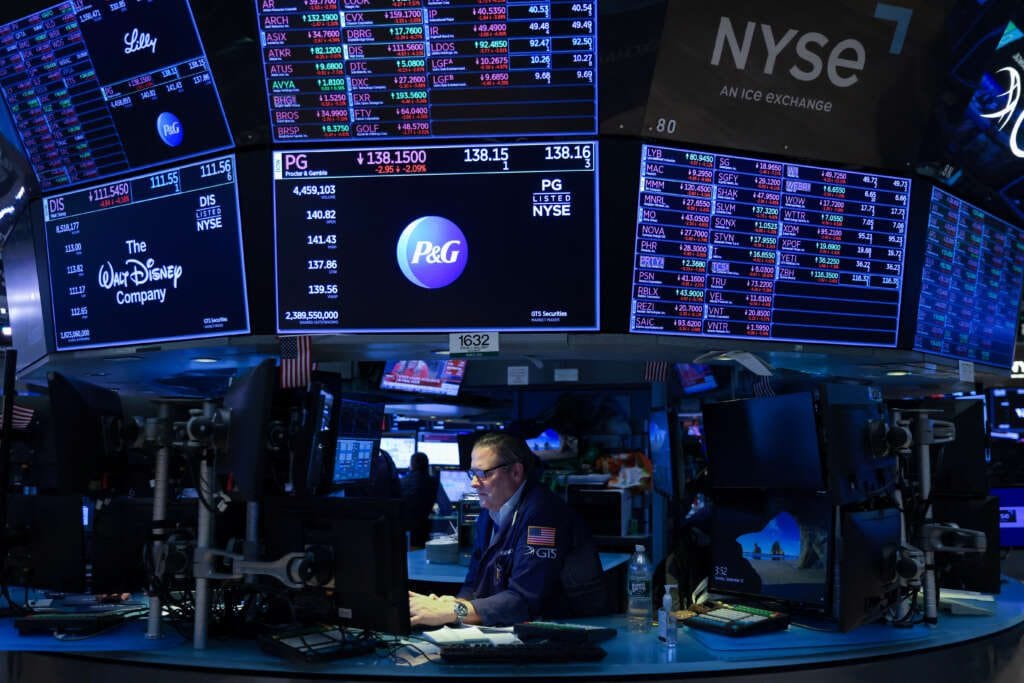
(Updates after U.S. close, adds commentary)
By Sinéad Carew
NEW YORK (Reuters) – The dollar index rallied on Tuesday and the S&P 500 tumbled 4% while Treasury yields surged after data showed U.S. consumer prices rising faster than expected in August, prompting bets for more aggressive Federal Reserve rate hikes.
Oil futures also lost ground after the Labor Department data on Tuesday showed that declining gasoline prices in August were offset by gains in rent and food costs. The Consumer Price Index gained 0.1% last month versus expectations for a 0.1% decline and after being unchanged in July.
Wall Street’s equity indexes saw their deepest one-day percentage declines since June 2020.
This was a sharp reversal after the major stock indexes had rallied on Monday and in the previous week as investors had bet Tuesday’s data would show an easing in inflation and provide a path for the Fed to ease its policy tightening. [.N]
But by Tuesday’s close, the prospects of more aggressive tightening were instead fueling investor fears about the economy.
“As the day went on it seems that there’s growing concern about the upcoming Fed meeting, concern that the Fed may make a more hawkish move than earlier anticipated,” said Greg Bassuk, chief executive of AXS Investments in New York.
“What grows from that is the greater likelihood the economy could be tipped into a recession.”
The Dow Jones Industrial Average fell 1,276.37 points, or 3.94%, to 31,104.97; while the S&P 500 declined 177.72 points, or 4.32%, to 3,932.69; and the Nasdaq Composite tumbled 632.84 points, or 5.16%, to 11,633.57.
“Moderating inflation is key to higher equity prices and at the moment inflation is running hot. That implies volatility will remain more the norm than the exception into year-end.” said Terry Sandven, chief equity strategist at US Bank Wealth Management in Minneapolis.
“It clearly suggests the Fed next week will deliver more of the same and remain unwavering in their pursuit to tame inflation.”
MSCI’s gauge of stocks across the globe shed 3.39% in its biggest daily decline since June 13 after the index had risen in the previous four sessions.
“This was another disappointment. It’s the old Charlie Brown analogy. Every time we’re ready to kick the ball, it’s moved away from us.” said Mona Mahajan, senior investment strategist at Edward Jones.
In currencies the dollar index rose 1.534% in its biggest one-day percentage gain since March 19, 2020, with the euro down 1.46% to $0.9971 on Tuesday.
The Japanese yen weakened 1.17% versus the safe-haven greenback at 144.52 per dollar, while Sterling was last trading at $1.1499, down 1.54% on the day. [FRX]
Meanwhile, U.S. Treasury yields surged and a recession warning – the yield curve inversion – widened after the inflation data also bucked bond investor expectations.
Benchmark 10-year notes last fell 14/32 in price to yield 3.4157%, from 3.362% late on Monday. The 2-year note last fell 10/32 in price to yield 3.7434%, up from 3.571% in the previous session.
The gap between yields on two- and 10-year notes, seen as a recession harbinger, was just under -33 basis points. [US/]
“It really comes down to how sticky inflation remains,” saidMauricio Agudelo, senior fixed income portfolio manager atHomestead Funds Advisers. “It’s a battle that the Fed willcontinue to fight and they will have to continue pressing,unfortunately at the risk of breaking something.”
Oil prices swung lower after the inflation data and renewed COVID-19 curbs in China, the world’s second-largest oil consumer, also weighed on crude prices.
Oil is generally priced in U.S. dollars, so a stronger greenback makes it pricier to holders of other currencies.
U.S. crude settled down 0.54% at $87.31 per barrel and Brent settled at $93.17, down 0.88% on the day.
The climbing dollar also put pressure on gold prices. Spot gold dropped 1.3% to $1,702.39 an ounce while U.S. gold futures fell 1.45% to $1,705.00 an ounce.
(Additional reporting by Herbert Lash and Caroline Valetkevitch in New York, Marc Jones in London, Yoruk Bahceli in Amsterdam; Editing by Louise Heavens, Nick Zieminski and Jonathan Oatis)


